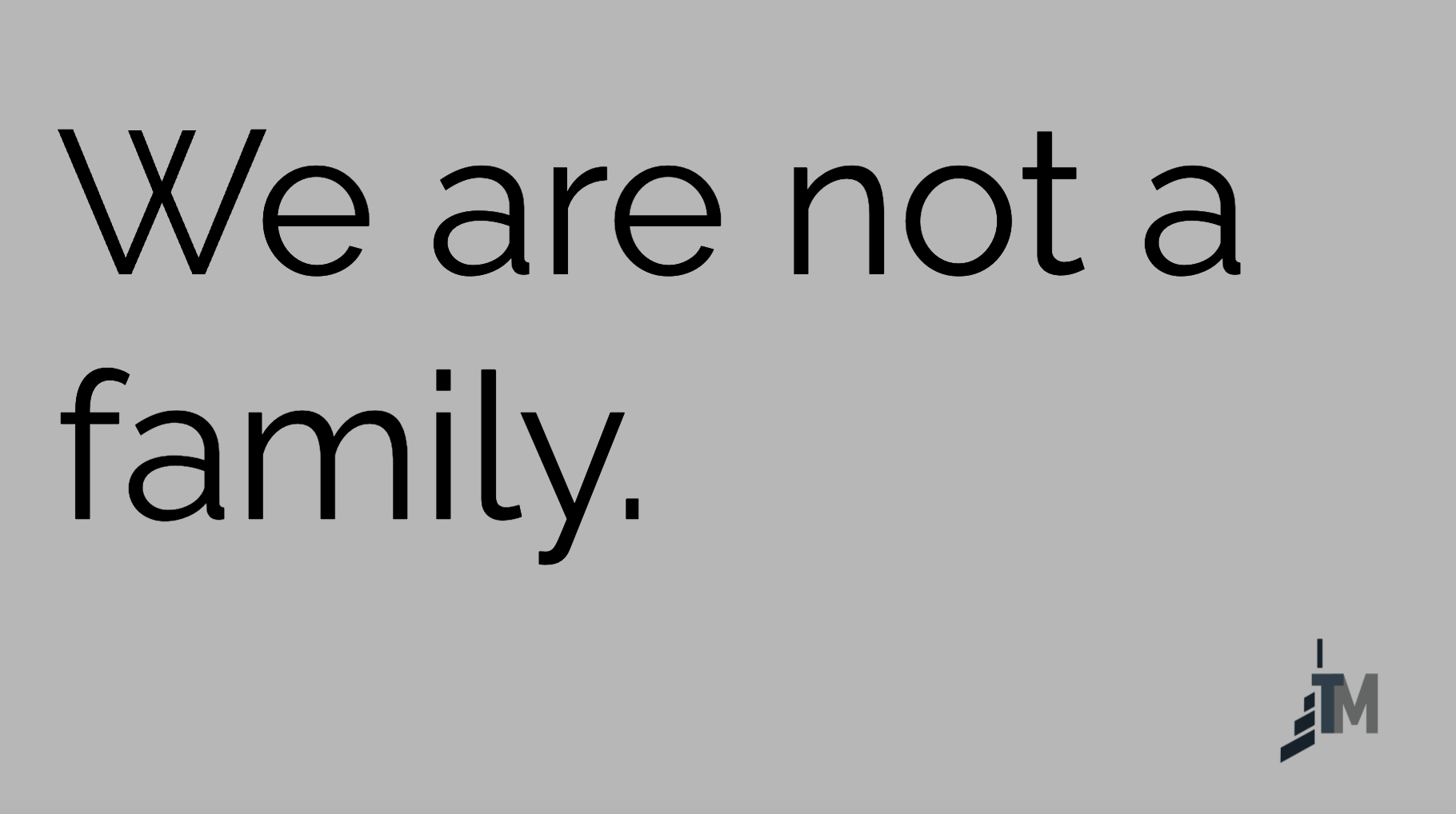Most Americans work for a family business.
That’s a surprising calculation because of the wide range of family-controlled firms, which are typically defined as any business led by two or more family members, or one in which family members own a controlling interest. A three-person construction company I worked for as a teenager was a family business, and so is Wal-Mart, the country’s largest employer. Three-quarters of new ventures start as family affairs, according to Cornell, and one-fifth of Fortune 500 companies are family operations, according to McKinsey.
That might be why I got an uncomfortable laugh from my coworkers when I presented in 2015 a slide during an all-team meeting with a message in big bold letters that read: We are not a family. We don’t choose our families, and many might do things for family that we wouldn’t do for, say, a coworker. In contrast, a team comes together to solve a challenge, and then goes home at the end of the day. The message became part of our on-boarding process and every single person who has worked for Technically Media has received it since then.
This kind of separation is still novel. My inspiration came from previously working at an organization that embraced “we are a family” work culture that I found unhealthy. Harvard Business Review published an article last month titled The Toxic Effects of Branding Your Workplace a “Family.” That positioning gives too much controlling leverage to management.
Team identity over family represents a shift in power back toward employees that coincides with a technical labor shortage.
Family blinds us to misdeeds. To take an example from a tech company and family-owned business, we learned this week that the CEO of a prominent civic tech firm headquartered in Philadelphia grossly mismanaged the disciplining of his wife and co-executive, who allegedly showed bias in hiring and used a racist slur in a work meeting. One horrifying workplace act was then worsened by the complex family dynamics.
By contrast, team identity over family represents a shift in power back toward employees that coincides with a technical labor shortage. For example, Google established modern “people operations” because the highly-profitable company had the resources to experiment and the motivation to get better at attracting and retaining software engineers and their peers. Many resist the family metaphor for work.
That doesn’t necessarily mean that all family businesses are problematic. They do contribute good. They outlast other companies on average; recent Harvard Business Review research shows they outperform the old “three-generation” rule. Family businesses are more likely to have women leadership than others, according to the Conway Center for Family Business. Immigrants are far more entrepreneurial than native-born Americans, and they disproportionately operate family businesses, according to the US Small Business Administration.
The real point then is that even family-run businesses don’t need to operate like a family.
Sign up for the Culture Builder newsletterBefore you go...
Please consider supporting Technical.ly to keep our independent journalism strong. Unlike most business-focused media outlets, we don’t have a paywall. Instead, we count on your personal and organizational support.
3 ways to support our work:- Contribute to the Journalism Fund. Charitable giving ensures our information remains free and accessible for residents to discover workforce programs and entrepreneurship pathways. This includes philanthropic grants and individual tax-deductible donations from readers like you.
- Use our Preferred Partners. Our directory of vetted providers offers high-quality recommendations for services our readers need, and each referral supports our journalism.
- Use our services. If you need entrepreneurs and tech leaders to buy your services, are seeking technologists to hire or want more professionals to know about your ecosystem, Technical.ly has the biggest and most engaged audience in the mid-Atlantic. We help companies tell their stories and answer big questions to meet and serve our community.
Join our growing Slack community
Join 5,000 tech professionals and entrepreneurs in our community Slack today!

The person charged in the UnitedHealthcare CEO shooting had a ton of tech connections

From rejection to innovation: How I built a tool to beat AI hiring algorithms at their own game

Where are the country’s most vibrant tech and startup communities?



